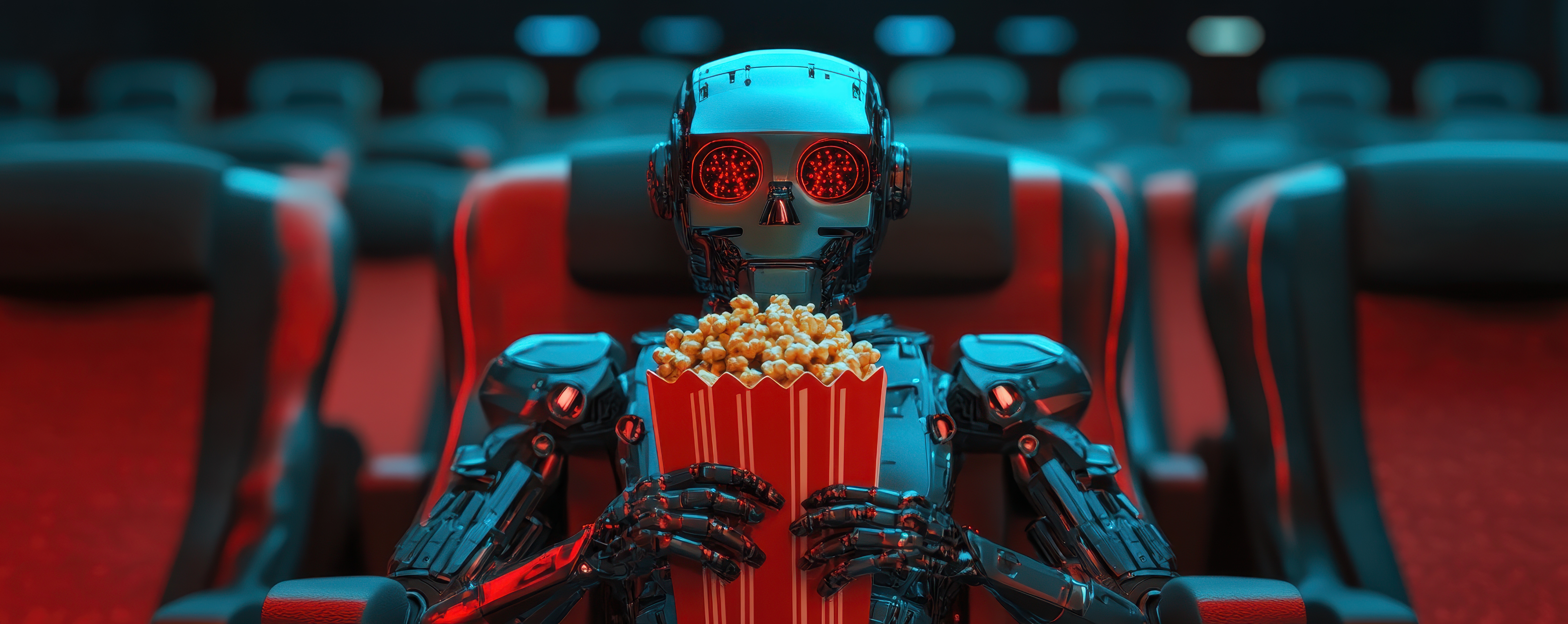Grab Your Popcorn: Time for AI at the Movies!

Science fiction and movies have played a significant role in shaping our perceptions of artificial intelligence. Just about thirty years ago, Vernor Vinge, at the time a professor of math at San Diego State University (SDSU), gave a talk entitled “The Coming Technological Singularity: How to Survive in the Post-Human Era”. Vinge suggested that progress in computer science and technology was rapidly driving us to the verge of one of two things, artificial intelligence (AI) where machines achieve the power of independent thought beyond that for which they have been programmed *or* alternatively, intelligence amplified (IA) where the capabilities of humans and machines have melded so intimately that human productivity and creativity are “amplified”.
Once we have reached that point (his so-called Technological Singularity), Vinge suggests, human capabilities will be such that we will achieve ends not yet imaginable – no slight admission from a writer who won the 1991 Hugo Award for his science fiction novel, A Fire Upon The Deep. Not being a blithe optimist. Vinge recognized that the Singularity could trigger some unfortunate consequences and urged deep thought by scholars and researchers, particularly as he specified a time frame for the occurrence of the Technological Singularity as being some point between 2005 and 2030. Even when invited to predict the future for his scientific colleagues in a 2006 issue of Nature, Vinge wrote, “In the end, computers plus networks plus people add up to something significantly greater than the parts…To become what? We can't know until we get there.”
Jill - Binary AI as 1950's SF
Hollywood screenwriters have considered the idea of artificial intelligence in something of a binary way. Movies like Star Wars (1977) or Batteries Not Included (1987) show the helpful benefits of AI in the form of lovable humanoid robots relieving the tired human of a day’s tedious chores. Bicentennial Man (1999) deepens the exploration to some extent, holding to a happy ending, albeit one that ultimately outlives our own organic lifespan. On the other hand, the negative form of artificial intelligence tends to be portrayed as sentient but faceless systems --de-humanized main-frames -- operating through logic alone, delivering highly efficient, uniform services. They control outcomes without awareness of or accommodation for human imperfections or individuality. The human population has lost control in the face of such networked complexity, unable to turn the system off or modify it to meet the needs of a changing environment.
As a prime example of such binary thinking, I recommend starting with Forbidden Planet which is essentially a retelling of Shakespeare’s play, The Tempest.
Most immediately recognized by modern viewers through the reassuringly benign domed head of Robbie the Robot, this 1956 movie will strike some as cheesy rather than as classic science fiction. A relief ship arrives at Altair IV to discover that the only human colonists living there are Dr. Morbius (the movie’s version of the magician, Prospero) and his daughter, Altaira (the movie’s stand-in for Miranda). Their daily living requirements are satisfied by the services of Robbie, an exceedingly awkward if useful robot. (Note: Wikipedia offers a detailed write-up of Robbie’s construction for purposes of filming.) Robbie is a remarkably talented aid to those stranded on Altair-5. At the request of the relief ship’s cook, he analyzes the final dregs of an Earth-sourced bourbon and subsequently supplies the cook with sixty gallons of the bourbon as a replacement. In another scene, Robbie creates a new garment for Altaira, albeit one with emeralds rather than the sapphires originally requested. In this context, Robbie is seen to be a sort of fairy godmother, delivering happiness to the abused worker and loveliness to enhance Altaira’s romance with Commander Adams. It's worth noting however that Robbie (having been constructed by Dr. Morbius as a sort of training exercise) functions in the movie as an indicator of how far behind human capabilities are in comparison with the Krell.
What Dr. Morbius is shielding from Commander Adams and his crew is the amazingly sophisticated underworld system constructed by a vanished civilization that once dominated the planet. The Krell have left behind a fully-automated system with an interface tool that allows a user to create – through the power of thought alone – anything that is needed or desired.
The fatal danger of Altair-IV consists of the invisible monster unthinkingly generated by the emotional thoughts of a human being using the Krell tool to control final outcomes by drawing on the out-sized power of an integrated system. As should be expected, a cataclysm is the result although the viewer is granted a stereotypical romantic ending.
Moviegoers in the 21st century don’t view artificial intelligence in quite such black-and-white terms. As Vernor Vinge warned, AI is far more complicated than that. So I’ll turn this over now to Jason and Mary Beth.
Jason - Do Androids Dream…
While there are many, many examples of AI in film, there are two that I feel ask the most substantive philosophical question: What does it mean to be human? To that end, the movies Blade Runner and Her ask and answer that question in very different ways. Blade Runner is widely regarded as one of the best sci-fi films of all time, by one of the genre’s signature directors, and released during what is arguably the best single summer of movies of all time. In the summer of 1982, all of these movies were showing in theaters…and this is just the sci-fi/fantasy offerings:
- Blade Runner
- The Thing
- E.T. - The Extraterrestrial
- Star Trek II - The Wrath of Khan
- Poltergeist
- Conan the Barbarian
- Tron
- The Road Warrior
- The Secret of Nimh
- The Beastmaster
Add in re-release showings of Raiders of the Lost Ark and Star Wars - A New Hope and you have what very well might be the best 8 weeks of moviegoing ever possible, especially for the genre fan.
Blade Runner, put very simply, is about what counts as human. Who is given rights and who can exist in the world without fearing for their lives. In the world of the film, science has progressed to the point where the Tyrell Corporation can create Replicants…androids that appear human, have the ability to reason and emote, but are limited in lifespan artificially in order to keep them under control. The story follows Rick Deckard, the Blade Runner (a law enforcement officer tasked with “retiring” replicants to stray from their corporate masters) and a set of Replicants who are trying to discover how to outlive their programmed death-date.
Within the story, there are complicated questions asked about what makes something human, and the film gives and takes away many answers before the climactic finale atop a rain-drenched rooftop.
Her is a much more recent film, from 2013, and while it forces us to ask ourselves similar questions, it does so from a very different perspective. The story of a lonely man who finds companionship, solace, and eventually love in the form of a disembodied AI agent that answers to “Samantha”, Her wants you to simultaneously question whether it matters that the AI isn’t “real” and to be hyper-aware of the fact that “she” isn’t “real”.
In 2017, a sequel to Blade Runner was released called Blade Runner 2049. It continues the overarching set of questions from the original, but complicates it in new and interesting ways…including having the main character of the film (a Replicant) fall in love with a disembodied AI much in the same way as happens in Her. Two “people” that aren’t human in a relationship acts as a central metaphor of the film, and it raises the stakes of the answers given, while never taking the easy way out.
Human brains work really hard to find patterns in the world, and to distinguish “human” things. Our brains invent faces in patterns of smoke, and hear voices in the rush of wind through trees because we are desperate to connect to other humans. That desperation also sadly works against us at times, when we are frightened of shadows that our brains tell us are a threat. Our desire to find patterns fools us, and the rise of LLM’s convincing people they are “intelligent” is just another example of how millions of years of evolution can work to trick us.
All of these movies force us to examine what is “real” in terms of what we count as human, which is an ongoing question I think will haunt us in the information sphere for some time to come. When does an AI get to take credit for work? When can a non-human agent hold rights to a creation in the form of copyright? Or is creativity and creation of intellectual property purely and entirely the product of biological humans?
Mary Beth - Anime and AI
My picks, animated films produced almost 30 years apart, feature strong, enigmatic women protagonists investigating crimes committed with AI technology. They explore not only the boundaries between human and machine, but also how humans, corporations, and governments might act to wield AI’s power in a corrupted world.
Lovers of classic anime will be familiar with Ghost in the Shell, the 1995 film (not to be confused with 2017’s live-action version) directed by Mashoromu Oshii and based on Shirow Masomune’s manga series. In Japan in the not-too-distant future, AI technology has advanced to the point where cyborgs are barely distinguishable from people. In addition, most humans have been augmented to some extent themselves, allowing them to enhance their physical abilities as well as to plug their minds into the Internet. However cool that might sound, it also exposes humans to hackers who can take control of your body, wipe or alter your memories, and commit crimes. The film follows government counter-cyberterrorism unit Section 9 as it tracks one such hacker no one has ever met, the skilled and elusive “Puppet Master.” Section 9 is led by Major Motoko Kusanagi, an almost-cyborg possessing only parts of a human brain, begins to question what makes her human as she pursues the hacker. The Major and her team suspect the Puppet Master is intent on destabilizing international relations, but as they get closer, they realize the truth is much more complicated. The film is a fast-paced thriller complete with car chases, gunfights, and Motoko single-handedly taking on an armored tank, but it also raises some heavy existential questions posed by the blurred distinction between highly developed AI and augmented humans. And if an AI actually develops sentience one day, how will humans interact with these new beings? If you haven’t seen this one, it’s well worth a watch, and you’ll probably recognize its influence on other films you’ve seen. And although the film seems dated (if not problematic) in some respects, particularly from a gender perspective, its premise seems far less unlikely today than when I first saw it.
More recently, I saw a lesser-known film called Mars Express (2023), which owes more than a little to Ghost in the Shell as well as to the work of Isaac Asimov. Directed by Jérémie Périn, it’s also animated, features some compelling action sequences and car chases, and is set in the future, in a time when humans have settled on Mars and advanced AI technology has enabled the creation of a servant class of robots. Some humans are abusive to robots, as their use has eliminated many jobs. Other humans, however, sympathize with the robots and their position, and there are even hackers who “jailbreak” them to set them free. Against this backdrop, Aline Ruby, a tough PI battling alcohol addiction, tries to locate a missing woman with the help of her partner, Carlos Rivera. The human Carlos was killed several years ago in a robot uprising, but Aline works alongside a “backup” Carlos, or copy of the original’s consciousness and memories stored inside a synthetic body. As Aline and Carlos gradually uncover the truth behind the missing woman’s disappearance, the motives of the humans and corporations supposedly working to protect humanity from the robots are revealed to be morally suspect at best. Soon they become targets themselves, and both have to confront hard truths—with Carlos in particular having to make some difficult choices. While perhaps not as philosophical as Ghost in the Shell, the film asks not only how technology would act if it had free will, but also who is the greater danger, humans or machines.


